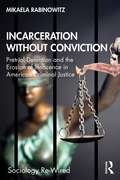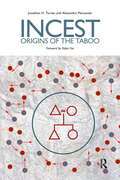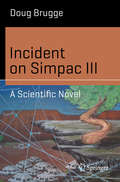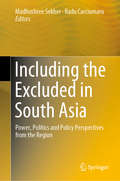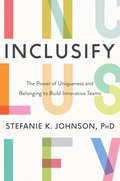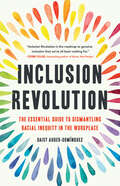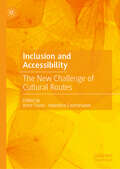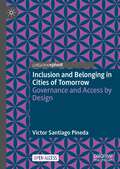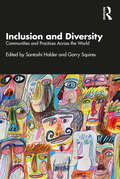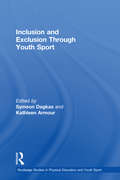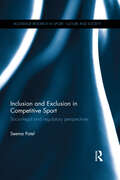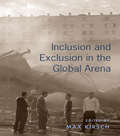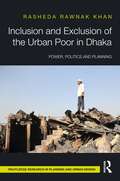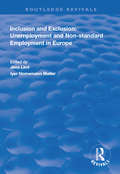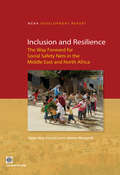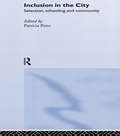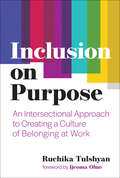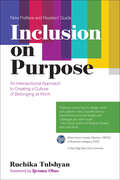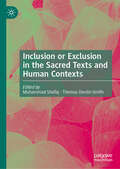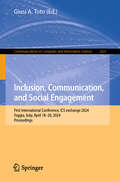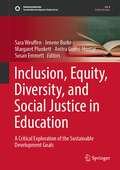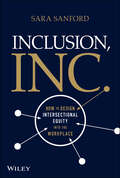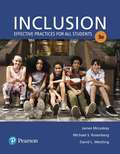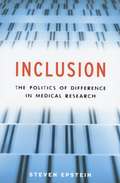- Table View
- List View
Incarceration without Conviction: Pretrial Detention and the Erosion of Innocence in American Criminal Justice (Sociology Re-Wired)
by Mikaela RabinowitzIncarceration Without Conviction addresses an understudied fairness flaw in the criminal justice system. On any given day, approximately 500,000 Americans are in pretrial detention in the US, held in local jails not because they are considered a flight or public safety risk, but because they are poor and cannot afford bail or a bail bond. Over the course of a year, millions of Americans cycle through local jails, most there for anywhere from a few days to a few weeks. These individuals are disproportionately Black and poor. This book draws on extensive legal data to highlight the ways in which pretrial detention drives guilty pleas and thus fuels mass incarceration--and the disproportionate impact on Black Americans. It shows the myriad harms that being detained wreaks on people’s lives and well-being, regardless of whether or not those who are detained are ever convicted. Rabinowitz argues that pretrial detention undermines the presumption of innocence in the American criminal justice system and, in so doing, erodes the very meaning of innocence.
Incest: Origins of the Taboo
by Jonathan H. Turner Alexandra MaryanskiThroughout history humans have been fascinated with incest. Stories, fables, literature, philosophers, church officials, and scientists have explored this mysterious topic. The taboo is critical to human survival, as incest threatens the species and patterns of human social organization. Drawing upon the rich legacy of theory, empirical data, and speculation about the origins of the incest taboo, this book develops a new explanation for, not only the emergence of the taboo in hominid and human evolutionary history, but also for the varying strength of the taboo for the incestuous dyads of the nuclear family, the different rates of incest of these dyads, and the dramatic differences the psychological pathology incest has on its younger victims. Synthesizing findings from biology, sociobiology, neurology, primatology, clinical psychology, anthropology, and sociology, the authors weave together a scenario of how natural selection initially generated mechanisms of sexual avoidance; and then, as the nuclear family emerged in hominid and human evolution, how sociocultural selection led to the development of the incest taboo.
Incident on Simpac III: A Scientific Novel (Science and Fiction)
by Doug BruggeA few hundred years into the future, a wave of space colonization follows a disastrous earlier attempt to inhabit nearby extrasolar planets. It is guided by a new computational method based on massive data-driven socio-cultural and socio-epidemiological modeling and using novel biological computers, fed with data on Earth’s history of successes and failures. Yet, in the newly settled Simpac system, some unexpected and worrying anomalies begin cropping up, making an urgent expedition to the system necessary: is it the underlying data, the computations, or is some unknown entity tampering with the space colonization program? A race against time ensues as the lives of four strangers begin to converge. While grounded in the social systems aspect, the author posits that the future is likely to be characterized by more biology-based tools than most contemporary science fiction – which most often relies entirely on non-biological hardware in terms of advanced technologies – predicts. The result is an entertaining and skillful blend of thriller and SF, complemented by a nontechnical appendix describing the underlying science.
Including LGBT Parented Families in Schools: Research to Inform Policy and Practice
by Tiffany Jones Trent MannThis book explores the experiences of LGBTQ+ parented families in school communities and provides a voice for this overlooked group who are becoming an increasingly common form of family diversity in school communities. Approaching the topic from a strength-based psychological perspective, the book presents LGBTQ+ parents’ suggestions for school improvements and supportive structures and provides empirical evidence to inform future LGBTQ+ inclusive educational policy. Research based yet practically focused, it will be a valuable resource for researchers, students and education professionals alike.
Including the Excluded in South Asia: Power, Politics and Policy Perspectives from the Region
by Madhushree Sekher Radu CarciumaruThis book analyses and discusses the multiple dimensions of social exclusion/inclusion seen in South Asia. It not only captures how ‘social exclusion’ is intrinsic to deprivation or deprivation in itself, but also the processes of political engagement and social interactions that the socially excluded develop as strategies and networks for their advancement. Consequently, the book goes beyond structures or agency, and examines the question of a more dynamic approach to provide spaces for the ‘socially excluded’ to self-manage exclusion, thereby raising discussions around the contested positions that underlie development discourse on social inequality.While social exclusion linked to identities is studied, the book argues that hierarchies and inequalities based on social identities cut across and affect various groups of excluded. Consequently, these phenomena create or lead to various processes of exclusion. The book illustrates that social exclusion should not be limited to privileging the differences that characterize the exclusionary processes, but should also comprise underpinning strategies of ‘inclusion’, emphasizing the need to focus on imperatives ‘to include’. As a result, the book acknowledges that social exclusion is not limited to analyzing the different identities that face exclusion, but also understanding the systems and processes that create social exclusion, or create opportunities for inclusion of the excluded.The book addresses readership across academic disciplines (including in the growing field of state capacity and governance), and practitioners (administrators and policy-making communities). Conclusively, the book, provides a platform to intensively exchange the multifaceted and critical issue of social exclusion/inclusion, and thus contributes to inclusive sustainable development discourse.
Inclusify: The Power of Uniqueness and Belonging to Build Innovative Teams
by Stefanie K. JohnsonIn this groundbreaking guide, a management expert outlines the transformative leadership skill of tomorrow—one that can make it possible to build truly diverse and inclusive teams which value employees’ need to belong while being themselves. Humans have two basic desires: to stand out and to fit in. Companies respond by creating groups that tend to the extreme—where everyone fits in and no one stands out, or where everyone stands out and no one fits in. How do we find that happy medium where workers can demonstrate their individuality while also feeling they belong?The answer, according to Stefanie Johnson, is to Inclusify. In this essential handbook, she explains what it means to Inclusify and how it can be used to strengthen any business. Inclusifying—unlike “diversifying” or “including”— implies a continuous, sustained effort towards helping diverse teams feel engaged, empowered, accepted, and valued. It’s no use having diversity if everyone feels like an outsider, she contends.In her research, Johnson found common problems leaders exhibit which frustrate their attempts to create diverse and cohesive teams. Leaders that underestimated the importance of group coherence and dynamics often have employees who do not feel like they belong; leaders that ignore the benefits of listening to different perspectives leave some people feeling like they cannot be their authentic selves.By contrast, leaders who Inclusify can forge strong relationships with their teams, inspire greater productivity from all of their workers, and create a more positive environment for everyone. Having a true range of different voices is good for the bottom line—it allows for the development of the best, most innovative, and creative solutions that are essential to success. Inclusify reveals the unexpected ways that well-intentioned leaders undermine their teams, explains how to recognize the myths and misperceptions that drive these behaviors, and provides practical strategies to become an Inclusifyer. By learning why uniqueness and belonging are so imperative, leaders can better understand what makes their employees tick and find ways to encourage them to be themselves while ensuring they feel like they are fully part of the group. The result is a fully engaged team filled with diverse perspectives—the key to creating innovative and imaginative ideas that drive value.
Inclusion Revolution: The Essential Guide to Dismantling Racial Inequity in the Workplace
by Daisy Auger-DomínguezA leading diversity executive offers step-by-step guidance for confronting racial bias in the workplace We are in the midst of a global reckoning on race, and corporations are on high alert. But conventional approaches have fallen short, leaving nagging questions about next steps. Why do diversity trainings fail? What&’s so wrong with a company&’s &“colorblind&” workplace culture? In Inclusion Revolution, Daisy Auger-Domínguez provides frank answers to why popular efforts fail. She then presents the definitive roadmap for revolution, through her dynamic step-by-step process: Reflect, Visualize, Act, and Persist. She offers proven, research-based strategies for racially inclusive management. Racial inequality in the workplace is a problem we can solve. Inclusion Revolution offers the necessary tools for managers to address issues of race, power, and exclusion, to build change that lasts. Because through the best teams, companies can finally create a stronger future.
Inclusion and Accessibility: The New Challenge of Cultural Routes
by Anna Trono Valentina CastronuovoThis book focuses on the inclusion of individuals with special needs within the tourism sector, with particular emphasis on cultural routes. Promoting sustainable cultural tourism and planning its development through sustainable strategies present significant challenges. A key objective is to strengthen the interconnection between tourism and both social and environmental sustainability. This involves addressing the needs of individuals with disabilities through social innovation, thereby supporting the transition toward an inclusive tourism model that fosters sustainable, intelligent, and inclusive growth. Following an overview of public strategies, educational initiatives and stakeholder engagement in the field of accessible tourism, this book presents several case studies that exemplify best practices. These examples illustrate how cultural routes can be transformed into meaningful community experiences by enhancing accessibility for individuals with disabilities.
Inclusion and Belonging in Cities of Tomorrow: Governance and Access by Design
by Victor Santiago PinedaThis open access book uncovers the historical context and entrenched beliefs that have perpetuated exclusionary urban landscapes and disadvantage for marginalized groups. It offers an in-depth exploration of the intricate interplay of geographical space, recognizing its pivotal role in shaping our cities and exacerbating spatial injustice. The construction industry, a vital agent in forging accessible environments, often falls short in accommodating persons with disabilities and older individuals. This important book underscores the urgent need for integrated approaches woven into the fabric of cities, companies, and the construction industry itself, to ensure universal accessibility. Drawing upon practical strategies and compelling case studies, the book presents actionable frameworks such as the DisCo Policy Framework and the Iceberg of Inequality Model, facilitating the assessment of progress towards achieving radical inclusion. Inviting readers to embark on a journey into the cities of tomorrow, where inclusion and belonging are the norm, it concludes with a simple idea: the future is accessible.
Inclusion and Diversity: Communities and Practices Across the World
by Santoshi Halder Garry SquiresThis volume presents a comprehensive overview of inclusion and diversity in education across the globe. It examines how more inclusive education systems can be built and covers areas and topics such as disability studies, sexual minorities, and indigenous communities, marginalized communities among others. The book presents perspectives of experienced and cutting-edge researchers on inclusive practices that facilitates participation, equity, and access from across countries such as India, the USA, Australia, the UK, Canada, South Africa, Japan, Pakistan, Rome, Hungary, Sweden, and others. It discusses how spoken language, race, gender, and religion contribute to inclusion and marginalization. The volume also explores ideas on how schools and educational systems can respond to diversity-related issues, and the lessons learned about how to improve capacities for further inclusion. Additionally, it provides a holistic understanding of the classroom practices and interventions adopted to handle the problems of students with diverse needs. The book volume facilitates understanding of the broader spectrum of various diversities existing in our society and also the strategic pathways for their inclusion. This incisive and comprehensive volume will be of interest to students, teachers, and researchers of education, inclusion and diversity, equity and access, disability studies, educational psychology, social work, sociology, and anthropology. It will also be useful for teacher training course, and anyone who is associated with or working in the field of diversity and inclusion.
Inclusion and Exclusion Through Youth Sport (Routledge Studies in Physical Education and Youth Sport)
by Symeon Dagkas and Kathleen Armour'We can reach far more people through sport than we can through political or educational programmes. In that way, sport is more powerful than politics. We have only just started to use its potential to build up this country. We must continue to do so.' – Nelson Mandela Nelson Mandela's statement reflects a widely held view that sport can contribute in unique and far-reaching ways to the delivery of important social outcomes. But is this really the case? Can sport bring people from different backgrounds together, and in so doing act as a force for social transformation and change? In the language of policymakers and practitioners, can sport contribute to social inclusion or could it be argued that sport acts to marginalize and disadvantage some groups in society? In other words could sport reinforce, rather than challenge, social inequality? Focusing on youth sport as a touchstone sector of sport in society, this book examines the theoretical and empirical bases of arguments for the role of sport in social inclusion agendas. Authors are drawn from around the world and offer critical perspectives on assumptions underpinning the bold claims made about the power of sport. This book represents the most up-to-date and authoritative source of knowledge on inclusion and exclusion in youth sport. As such, it is essential reading for those who want to use sport to 'make a difference' in young people's lives. It is, therefore, recommended for students, researchers, policy makers and practitioners working in sports development, sports coaching, sport studies or physical education.
Inclusion and Exclusion in Competitive Sport: Socio-Legal and Regulatory Perspectives (Routledge Research in Sport, Culture and Society)
by Seema PatelSociety is obsessed with categorising and treating individuals and groups according to their physical and non-physical differences, such as sex, gender, disability and race. This treatment can lead to the inclusion or exclusion of an individual from the tangible and intangible benefits of society. Where this practice becomes discriminatory, legal frameworks can protect human rights and ensure that people are treated with due respect for their similarities and differences. In a sporting context, the inclusion and exclusion of athletes based upon their differences is often a necessary part of the essence of competitive sporting activity, arranged around rules and categories that can have an unequal exclusionary impact on certain classes of individual. Dominant sporting cultures can also have exclusionary effects. This important and innovative book seeks to investigate the socio-legal and regulatory balance between inclusion and exclusion in competitive sport. It critically analyses a range of legal and non-legal cases concerning sport-specific inclusion and exclusion in the areas of sex, gender, disability and race, including those cases involving Oscar Pistorius, Caster Semenya and Luis Suarez, to identify the extent to which the law and sport adopt a justifiable and legitimate inclusive or exclusive approach to participation. The book explores national and international regulatory frameworks, identifying deficiencies and good practice, and concludes with recommendations for regulatory reform. Inclusion and Exclusion in Competitive Sport is important reading for anybody with an interest in the relationship between sport and wider society, sports development, sport management, sports law, or socio-legal studies.
Inclusion and Exclusion in the Global Arena
by Max KirschThis collection of essays addresses the inclusion and exclusion of peoples, populations and regions in an era of global economic and social integration. Although many publications have discussed the way in which globalization has changed the nature of boundaries, space and the movement of peoples, there is a wide gap in a literature that rarely addresses the reaction of local communities and inclusion for some stakeholders in decision making while excluding others, particularly in regard to global integration of industry, the legislation of planning, and trade. This gap has often led to narrow and sometimes misleading ways of presenting the results of globalizing processes. This collection aims to bridge this gap by providing on-the ground case studies that lead to alternative ways of viewing current conceptual frameworks of globalization and its consequences. This collection is an elaboration of a special issue of Urban Anthropology that contained essays by June Nash, Jack Goody, Helen Safa and Max Kirsch. The special issue addressed concerns that have become prominent not only in anthropology but in the wider social sciences and humanities. The reader focuses on the conceptual divisions among the constructs of space and place, indigenous strategies for autonomy, polity and global planning mechanisms, and the role of trans-national corporations in community disintegrations and resistance.
Inclusion and Exclusion of the Urban Poor in Dhaka: Power, Politics, and Planning
by Rasheda Rawnak KhanInclusion and Exclusion of the Urban Poor in Dhaka explores how the inhabitants of poor neighborhoods in Dhaka, Bangladesh, gain inclusion in the city at the face of exclusion. The book considers how the people of poor neighborhoods encounter the exclusionary behavior of city development, and how their inclusionary attempts have influenced the urban design. The book is presented in two parts: first, it explains how people in poor neighborhoods face exclusion because of the imbalance of power and politics. Second, it demonstrates how the existing exclusion of urban poor is affecting their strategies to gain access to urban services through people’s power and politics. Focusing on the transdisciplinary field of urban anthropology, the chapters uncover the urban forces, policies and actions that facilitate urban politics. It also investigates the people who live in poor neighborhoods, who in the face of exclusion, have included themselves in urban development planning and design by employing diverse strategies against those forces in the urban politics, e.g., accepting dominance, bargaining, or having control over their lives. This book will recontextualize an ethnographic inquiry into the exclusion and inclusion of the people within city development design, plans and innovations in applications of anthropological theory and methodology. This book will encourage the reader to understand the politics of state’s development projects and plans, and furthermore instigate the city government, planners and policymakers to focus on the people's political power and agency that enables them to achieve inclusion. It will therefore be of interest to researchers and students of urban planning and development, urban geography, and urban anthropology, as well as planning professionals and policymakers.
Inclusion and Exclusion: Unemployment And Non-standard Employment In Europe (Routledge Revivals)
by Iver Hornemann Møller Jens LindPublished in 1999, this text is influenced by two sets of theories, namely regulation theories and theories on social citizenship. Regulation theories are mainly used as an overall guideline - a frame of reference - in the analysis of changed, unchanged and new types of integration and differentiation in working life and its social modes of regulations. The perspective on social citizenship is concentrated on participation in working life - what are the changes in working life (unemployment and non-standard employment) and what are the conditions and the outcome of social regulation? These questions are thematized in two articles and analyzed in chapter 7 which focuses on four welfare state models represented by Portugal, England, the Netherlands and Denmark. The book aims to contribute material on labour market segmentation and social policies to combat labour market marginalization in four countries studies representing typical European welfare state models.
Inclusion and Resilience
by Victoria Levin Matteo Morgandi Joana SilvaThe report aims to meet two broad objectives: (a) enhance knowledge about the current state of existing social safety nets (SSNs) and assess their effectiveness in responding to new and emerging challenges to the poor and vulnerable in the region by bringing together new evidence, data, and country-specific analysis; and (b) open up and inform a debate on feasible policy options to make SSNs in the Middle East and North Africa more effective and innovative. The first chapter, 'a framework for SSN reform,' describes and illustrates the reasons for the region's growing need for SSN reform and establishes the framework for renewed SSNs. It identifies key goals for SSNs (promoting social inclusion, livelihood, and resilience) and illustrates how these goals have been achieved in some parts of the region and elsewhere. The second chapter, 'key challenges that call for renewed SSNs,' analyzes the challenges facing the region's poor and vulnerable households, which SSNs could focus on as a priority. Two large groups are at higher-than-average poverty risk: children and those who live in rural or lagging areas. The third chapter, 'the current state of SSNs in the Middle East and North Africa,' analyzes SSN spending and assesses different aspects of the SSN systems' performance. The fourth chapter, 'the political economy of SSN reforms in the Middle East and North Africa: what do citizens want?' presents new evidence on citizens' preferences concerning redistribution and SSN design, using newly collected data. It also discusses how political economy considerations could be taken into account in designing renewed SSNs in the region. The fifth chapter, 'the way forward: how to make safety nets in the Middle East and North Africa more effective and innovative,' proposes an agenda for reform and the path for moving forward, using global experience and the evidence presented in the preceding chapters.
Inclusion in the City: Selection, Schooling and Community
by Patricia PottsInclusion in the City explores inclusion and exclusion in the context of policy and practice in one English city - Birmingham. Here, a commitment to redressing the inequalities experienced by many learners has been inhibited by difficulty in securing agreement to a definite policy for inclusion and, consequently, in sustaining initiatives for strengthening participation in community comprehensive education.Grounded in an understanding of inclusion as a political and moral project, the book presents a range of perspectives from policymakers and practitioners. Detailed case studies, based on research specially undertaken for this book, relate inclusion to key issues in contemporary education such as; the effects of selection by attainment; faith schools and their communities; single sex education and inclusive schools; participation in further education; and social mobility.Insightful, thought provoking and original, Inclusion in the City detaches processes of inclusion and exclusion from the language of educational reform. In so doing it highlights links between participation in education and poverty, gender and cultural background, as well as the absence of a link between urban and educational renewal.
Inclusion on Purpose: An Intersectional Approach to Creating a Culture of Belonging at Work
by Ruchika TulshyanHow organizations can foster diversity, equity, and inclusion: taking action to address and prevent workplace bias while centering women of color.Few would disagree that inclusion is both the right thing to do and good for business. Then why are we so terrible at it? If we believe in the morality and the profitability of including people of diverse and underestimated backgrounds in the workplace, why don&’t we do it? Because, explains Ruchika Tulshyan in this eye-opening book, we don&’t realize that inclusion takes awareness, intention, and regular practice. Inclusion doesn&’t just happen; we have to work at it. Tulshyan presents inclusion best practices, showing how leaders and organizations can meaningfully promote inclusion and diversity. Tulshyan centers the workplace experience of women of color, who are subject to both gender and racial bias. It is at the intersection of gender and race, she shows, that we discover the kind of inclusion policies that benefit all. Tulshyan debunks the idea of the &“level playing field&” and explains how leaders and organizations can use their privilege for good by identifying and exposing bias, knowing that they typically have less to lose in speaking up than a woman of color does. She explains why &“leaning in&” doesn&’t work—and dismantling structural bias does; warns against hiring for &“culture fit,&” arguing for &“culture add&” instead; and emphasizes the importance of psychological safety in the workplace—you need to know that your organization has your back. With this important book, Tulshyan shows us how we can make progress toward inclusion and diversity—and we must start now.
Inclusion on Purpose: An Intersectional Approach to Creating a Culture of Belonging at Work
by Ruchika TulshyanHow organizations can foster diversity, equity, and inclusion: taking action to address and prevent workplace bias while centering women of color.Few would disagree that inclusion is both the right thing to do and good for business. Then why are we so terrible at it? If we believe in the morality and the profitability of including people of diverse and underestimated backgrounds in the workplace, why don't we do it? Because, explains Ruchika Tulshyan in this eye-opening book, we don't realize that inclusion takes awareness, intention, and regular practice. Inclusion doesn't just happen; we have to work at it. Tulshyan presents inclusion best practices, showing how leaders and organizations can meaningfully promote inclusion and diversity.Tulshyan centers the workplace experience of women of color, who are subject to both gender and racial bias. It is at the intersection of gender and race, she shows, that we discover the kind of inclusion policies that benefit all. Tulshyan debunks the idea of the &“level playing field&” and explains how leaders and organizations can use their privilege for good by identifying and exposing bias, knowing that they typically have less to lose in speaking up than a woman of color does. She explains why &“leaning in&” doesn't work—and dismantling structural bias does; warns against hiring for &“culture fit,&” arguing for &“culture add&” instead; and emphasizes the importance of psychological safety in the workplace—you need to know that your organization has your back. With this important book, Tulshyan shows us how we can make progress toward inclusion and diversity—and we must start now.
Inclusion or Exclusion in the Sacred Texts and Human Contexts
by Muhammad Shafiq Thomas Donlin-SmithThis work delves into the fundamental issue of Otherness, from both sacred texts and communal experiences. While the title adopts the dyad of “inclusion” or “exclusion”, these analyses broadly reflect nuanced critical considerations. Filled with profound psychological, theological, sociological, anthropological, and ethical dimensions, experiencing the Other is richly expressed within religious traditions. This book is a must for scholars interested in a multi-disciplinary approach to inclusivity and religion.
Inclusion, Communication, and Social Engagement: First International Conference, ICS exchange 2024, Foggia, Italy, April 18–20, 2024, Proceedings (Communications in Computer and Information Science #2521)
by Giusi A. TotoThe digital revolution has radically transformed modes of communication, relationships, and learning, posing new challenges but also offering unprecedented opportunities. This book constitutes the proceedings of the First International Conference on Inclusion, Communication and Social Engagement, ICS exchange 2024, which deals with the future of the inclusion paradigm in education, approaching the topic from multiple perspectives: psychology, education, inclusion, social engagement, communication, and learning & technologies. The 33 full papers presented in this book were carefully reviewed and selected from 51 submissions. The research presented here highlights the importance of integrating technologies, active methodologies, and inclusive assessment tools into initial and ongoing training programs.
Inclusion, Equity, Diversity, and Social Justice in Education: A Critical Exploration of the Sustainable Development Goals (Sustainable Development Goals Series)
by Margaret Plunkett Jenene Burke Sara Weuffen Anitra Goriss-Hunter Susan EmmettThis book presents an edited collection of critical discourse situated in the fields of diversity and inclusion broadly, and more specifically, within the discipline of education. Each chapter articulates the importance of educational diversity in achieving the United Nations Sustainable Development Goal 4. The edited collection presents a grounding narrative of equitable learning opportunities and experiences via interpretivist theoretical frameworks and student-centered methodologies. The combination of these approaches, combined within the strong and scholarly-informed social justice lens, reminds us, that the onus of education is to acknowledge, recognise, respect, and engage with the diverse student cohorts, learning needs, and multiple knowledges and cultures that exist in educational contexts. This edited collection creates a holistic discourse around the experiences, interrogations, and innovations occurring within education communities to foreground deeper and more holistic understanding of the intersectionality of diversity and inclusion existing within the contemporary educational settings.
Inclusion, Inc.: How to Design Intersectional Equity into the Workplace
by Sara SanfordDesign systemic equity and diversity into your organization Inclusion, Inc: How to Design Intersectional Equity into the Workplace moves beyond having tough conversations to deliver an innovative and proven approach to organizational diversity. Eschewing the “mindset-first” approach taken by many diversity, equity, and inclusion (DEI) programs, author and GEN founder Sara Sanford focuses on countering the systemic barriers that abet inequity by adjusting “cultural levers” to facilitate organization-wide change. Inclusion, Inc offers sustainable and cost-effective solutions that yield real, measurable returns, supported by: Data from thousands of surveys and interviews with executive-level changemakers. Case studies from GEN-certified organizations. Innovations drawn directly from the latest in behavioral economics and design-centered thinking. Perfect for business leaders, human resources and DEI professionals, and scholars and students of business, Inclusion, Inc will also prove invaluable to underrepresented employees and their allies seeking real, evidence-based solutions to the dilemma they frequently face: assimilate, or leave.
Inclusion: Effective Practices for All Students
by Michael S. Rosenberg James McLeskey David L. WestlingInclusion: Effective Practices for All Students examines the foundations of successful inclusion; provides information on how to meet the needs of all students in brief, cross-categorical chapters; and offers effective, field-tested, evidence-based practices to help teachers make a seamless transition from theory to practice in the classroom. This new third edition includes Deepen Your Knowledge features; a full chapter on students from culturally and linguistically diverse backgrounds; and new chapters on effective strategies for addressing the needs of students with severe disabilities, effective strategies for providing effective mathematics instruction for students in inclusive classrooms, and the four key pillars associated with successful implementation of inclusive practices. Also included are 68 step-by-step strategies for improving outcomes for students with disabilities and others who struggle in school.
Inclusion: The Politics of Difference in Medical Research (Chicago Studies In Practices Of Meaning Ser.)
by Steven EpsteinWith Inclusion, Steven Epstein argues that strategies to achieve diversity in medical research mask deeper problems, ones that might require a different approach and different solutions. Formal concern with this issue, Epstein shows, is a fairly recent phenomenon. Until the mid-1980s, scientists often studied groups of white, middle-aged men—and assumed that conclusions drawn from studying them would apply to the rest of the population. But struggles involving advocacy groups, experts, and Congress led to reforms that forced researchers to diversify the population from which they drew for clinical research. While the prominence of these inclusive practices has offered hope to traditionally underserved groups, Epstein argues that it has drawn attention away from the tremendous inequalities in health that are rooted not in biology but in society. “Epstein’s use of theory to demonstrate how public policies in the health profession are shaped makes this book relevant for many academic disciplines. . . . Highly recommended.”—Choice “A masterful comprehensive overview of a wide terrain.”—Troy Duster, Biosocieties
